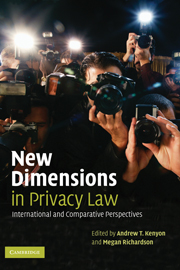Book contents
- Frontmatter
- Contents
- List of contributors
- Preface
- 1 New dimensions in privacy: Communications technologies, media practices and law
- 2 Privacy and freedom of speech
- 3 Revisiting the American action for public disclosure of private facts
- 4 The internet and private life in Europe: Risks and aspirations
- 5 APEC's privacy framework sets a new low standard for the Asia-Pacific
- 6 Copyright, privacy and digital rights management (DRM)
- 7 Why there will never be an English common law privacy tort
- 8 The ‘right’ of privacy in England and Strasbourg compared
- 9 Privacy and constitutions
- 10 Celebrity privacy and benefits of simple history
- Bibliography
- Index
- Index of laws and directives
- Index of case references
5 - APEC's privacy framework sets a new low standard for the Asia-Pacific
Published online by Cambridge University Press: 24 July 2009
- Frontmatter
- Contents
- List of contributors
- Preface
- 1 New dimensions in privacy: Communications technologies, media practices and law
- 2 Privacy and freedom of speech
- 3 Revisiting the American action for public disclosure of private facts
- 4 The internet and private life in Europe: Risks and aspirations
- 5 APEC's privacy framework sets a new low standard for the Asia-Pacific
- 6 Copyright, privacy and digital rights management (DRM)
- 7 Why there will never be an English common law privacy tort
- 8 The ‘right’ of privacy in England and Strasbourg compared
- 9 Privacy and constitutions
- 10 Celebrity privacy and benefits of simple history
- Bibliography
- Index
- Index of laws and directives
- Index of case references
Summary
Introduction
The APEC (Asia-Pacific Economic Cooperation) economies have adopted what is now called the APEC Privacy Framework, the most significant international privacy instrument since the EU Privacy Directive of the mid-1990s. APEC Ministers at their November 2004 meeting in Santiago, Chile, announced their endorsement of the Framework, which had been developed over the last two years by APEC's Electronic Commerce Steering Group (ECSG) Privacy Subgroup.
US Secretary of State Colin Powell praised the Framework, warning APEC ministers that a multiplicity of privacy standards could create confusion in the marketplace and impede information flows that the US considers vital to conducting business globally. Powell endorsed ‘region-wide privacy policy compatibility’ based on the APEC Framework. The United States' endorsement is a clear signal that APEC must have come up with something rather different from the European Union's Privacy Directive, which has led to tensions between the USA and Europe, and between Europe and Australia.
The significance of the twenty-one APEC economies adopting common information privacy standards cannot be doubted. The APEC economies are located on four continents, account for more than a third of the world's population, half its GDP, and almost half of world trade.
The APEC Privacy Framework consists of a set of nine ‘APEC Privacy Principles’ in Part III, plus a preamble and scope note in Parts I and II. As a set of information privacy principles the APEC Framework is complete, and we can make an assessment of it.
- Type
- Chapter
- Information
- New Dimensions in Privacy LawInternational and Comparative Perspectives, pp. 91 - 120Publisher: Cambridge University PressPrint publication year: 2006
- 22
- Cited by

